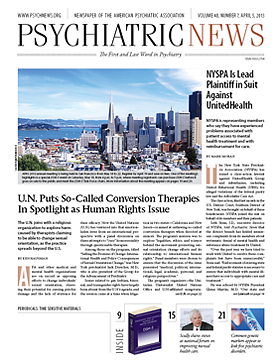This column includes questions concerning sexual dysfunction, gender dysphoria, and disruptive, impulse-control, and conduct disorders. A number of changes occurred in DSM-5 concerning these disorders. In contrast to DSM-IV, gender-specific sexual dysfunctions have been added and, for females, sexual desire and arousal disorders have been combined into one disorder (female sexual interest/arousal disorder). Gender dysphoria is new in DSM-5 and reflects a change in conceptualization of its defining features by emphasizing the phenomenon of “gender incongruence” rather than cross-gender identification per se, as was the case in DSM-IV gender identity disorder.
The chapter on disruptive, impulse control, and conduct disorders is new to DSM-5. It combines disorders that were previously included among disorders usually first diagnosed in infancy, childhood, adolescence, or impulse-control disorders not otherwise specified (that is, oppositional defiant disorder; conduct disorder; other specified and unspecified; disruptive, impulse-control, and conduct disorders; and intermittent explosive disorder). These disorders are all characterized by problems in emotional and behavioral self-control.
1. Sexual dysfunction: Which of these describes a condition or disorder that would be properly diagnosed as “other specified sexual dysfunction”?
a) Medical-induced sexual dysfunction b) Sexual aversion c) Erectile dysfunction d) Female sexual interest/arousal disorder e) Delayed ejaculation
2. Gender dysphoria: Which of the following diagnoses has been eliminated in DSM-5?
a) Gender identity disorder b) Borderline personality disorder c) Gender dysphoria d) Pedophilic disorder e) Transvestic disorder
3. Disruptive, impulse-control, and conduct disorders: A 16-year-old boy with a long history of defiant behavior toward authority figures also has associated aggression toward peers (gets into fights at school), his parents, and objects (punching holes in walls, breaking doors). Furthermore, he has begun to steal from stores and his parents (money, jewelry), and he frequently lies. He does not seem pervasively irritable or depressed, and has no sleep disturbance or psychotic symptoms. What is the likely DSM-5 diagnosis for this patient?
a) Oppositional defiant disorder b) Conduct disorder c) Attention-deficit/hyperactivity disorder d) Major depressive disorder e) Disruptive mood dysregulation disorder
These questions are from
DSM-5 Self-Exam Questions: Test Questions for the Diagnostic Criteria, which may be preordered from American Psychiatric Publishing at
http://www.appi.org/SearchCenter/Pages/SearchDetail.aspx?ItemId=62467. The book, available in August, contains 500 questions for all the categories of psychiatric disorders and includes Section III. ■
